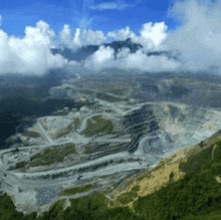Large scale mine and oil production has "sparked civil strife, caused massive environmental damage, arguably distorted the economy, and brought about a range of negative impacts on communities" (PNG Mine Watch)

Violence erupts at Porgera mine. Photo: Jethro
Source: Global Post
Papua New Guinea (PNG) is facing a key challenge in transferring its massive mining industry profits into improving the lives of the half of the population living in poverty, the New Zealand author of a United Nations report on the Pacific island nation said Friday.
Mining and oil production had reaped 60 billion U.S. dollars since independence 40 years ago, but 40 percent of PNG's 7 million mostly rural population lived on less than a dollar a day and a quarter of children had no schooling, Glenn Banks, an associate professor in Development Studies at Massey University, said in a statement.
The lead author of the "Papua New Guinea National Human Development Report 2014" for the United Nations Development Programme (UNDP) said PNG was experiencing a "paradox of plenty," with 14 years of economic growth and the economy set to grow by 20 percent next year, but little change in poverty levels and rising inequality.
The report noted improvements in human development, such as increases in life expectancy, per capita income and educational achievement, while highlighting the significant opportunities from an economic boom based on the mining of gold, silver, copper, cobalt, nickel, crude petroleum and natural gas.
While large scale mine and oil production has underpinned some health and education developments, it has also "sparked civil strife, caused massive environmental damage, arguably distorted the economy, and brought about a range of negative impacts on communities," according to the report.
Banks said better governance and public service delivery, as well as more effective, inclusive policies were among policy options that would address the problems.
Appointing a mining ombudsman and an independent grievance mechanism to resolve conflicts of interest between indigenous landowners and mining corporations were also key options.
"We've already had good feedback from within government that they are interested in talking further with UNDP to put into place some of the ideas the report proposes," said Banks.
- Elizabeth1's blog
- Log in to post comments
